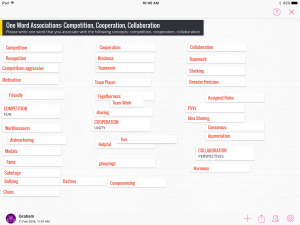When we think about the role competition plays in social relationships, it is often remarked how competition creates divides and alienates students who don’t fit into the system. Now we have discussed this previously, so that isn’t the point of this reflection, but what is, is that competition also acts in the inverse of this alienation. It can bond, solidify, and bring people together. The connections that competition creates are incredible and are links that can last for decades. That is the power of teamwork. It works to teach people the skills they will need to engage in competition, cooperation, and collaboration. Three essential skills, all different, but all important nonetheless.
If we looks at the nature of our world, the reality is that we live in a society that is overtly competitive. To study to be the best, and to work towards that is an essential skill. I truly believe that this passion can push students to achieve their best and is the reality they will be facing when they enter the real world. Getting a job, being selected for a promotion, or even getting into an university program such as UBC’s Teacher Education program, you will be competing for those spots, so providing some scenarios where students need to reach high is essential.
Additionally, while competition may seem contradictory to cooperation, it’s is actually intrinsically linked. Cooperation is one aspect of teamwork and competition breeds teamwork. As stated above, it, brings people together to complete a task. This can involve competitive spirit, in that it brings people together against another team, and that this “versus” atmosphere pushes people to do their best for their team. Additionally, it can work towards a differentiation of instruction to best complete the task. This specialization draws on the strength of the individuals while still working together. This advanced organizational structure is one that is fostered by competitive spirit and a skill that students can rely on after the exit school. Finally, collaboration is a concept that is seemingly placed on another level aside from both competition and cooperation. It is stated that cooperation, while working together, still is motivated by extrinsic forces. It is still self-serving, similar to competition. Collaboration is said to remove those barriers and work together in an intrinsically motivated, selfless system of free information and skills exchange. This is an ideal scenario and one that is very attractive. I will say that for many activities this system is the goal. But I will conclude here with a question, or a few, for collaboration (yes I am asking a question to a metaphysical concept): Can you not achieve collaboration within a team, while still existing in a competitive environment? Are the two mutually exclusive and by introducing competition, do we remove all chance of collaboration within a team? Is it destined to be self-serving? I don’t have the answer to this and I will leave my musings on this for another post but I will conclude with these two points/questions:
- Is there ever a situation where collaboration, true collaboration, takes place or is it just an unachievable dream?
- In a situation where a sports team that “clicks” down to the point where they instinctively understand each other and can work together, sometimes no verbally and simply reacting on feeling alone, is that not collaboration in a competitive environment?
Ideas inspired by:
Snow, C. C. (2015). Organizing in the age of competition, cooperation, and collaboration. Journal of Leadership & Organizational Studies, 22(4), 433. http://jlo.sagepub.com/content/22/4/433.full.pdf
